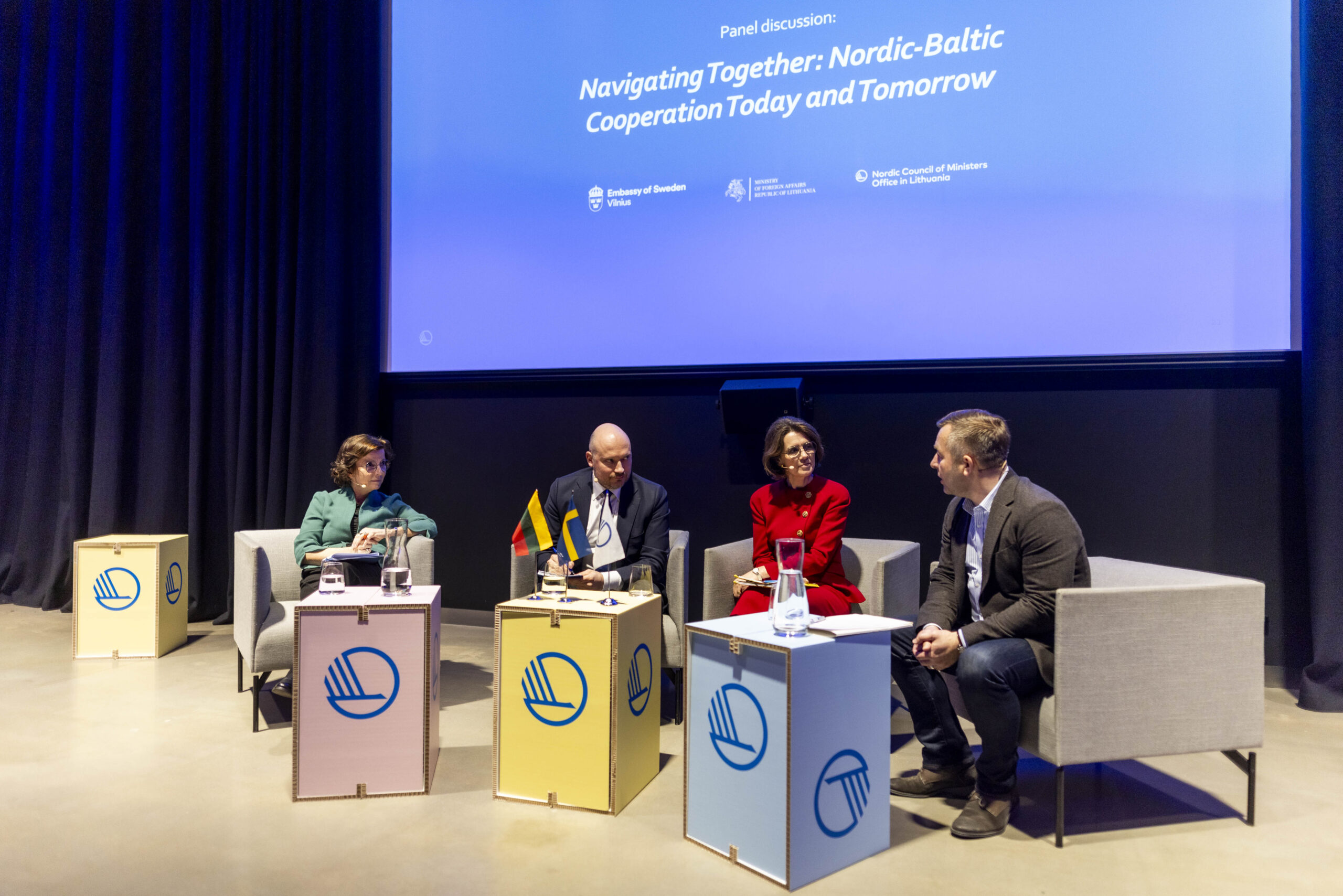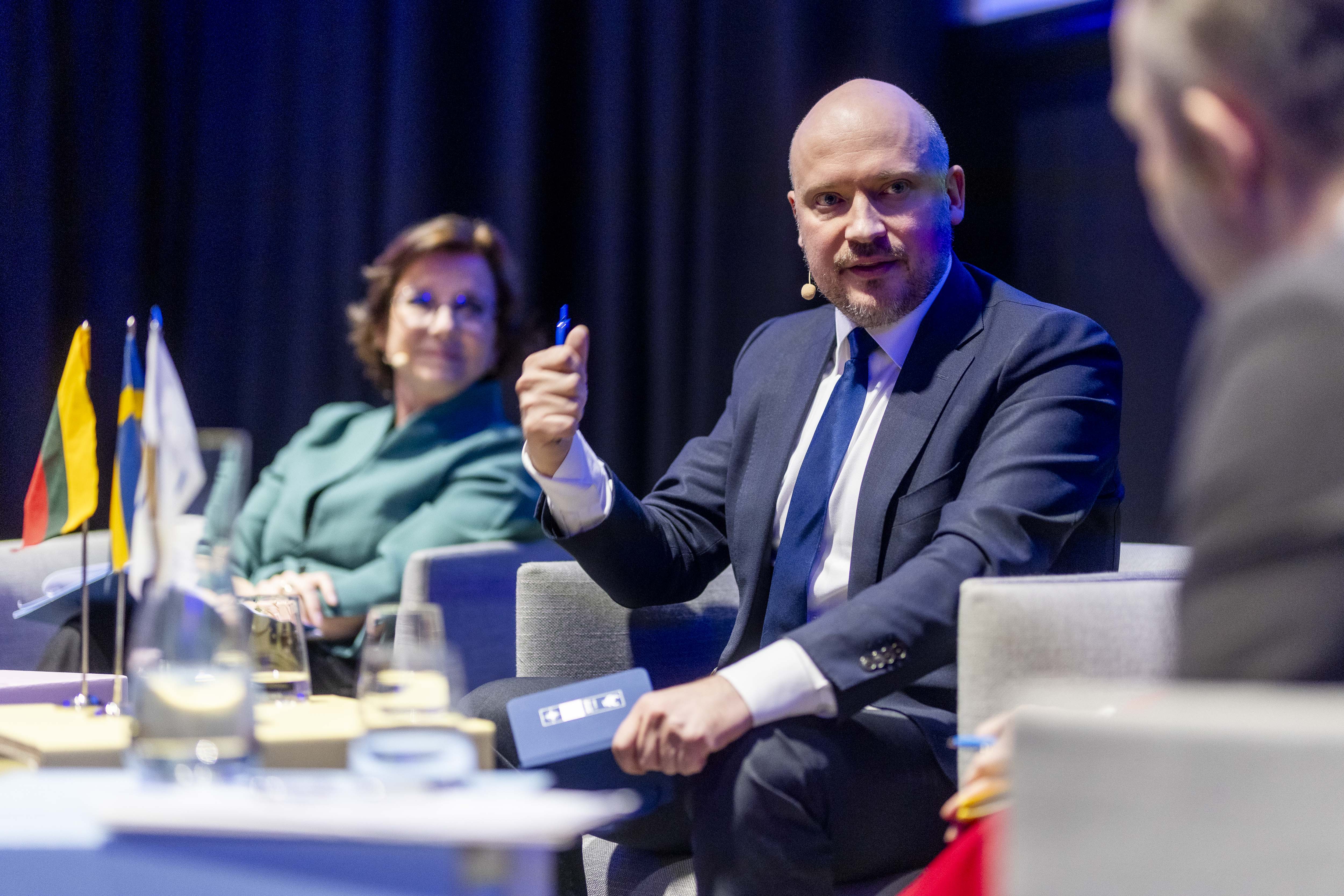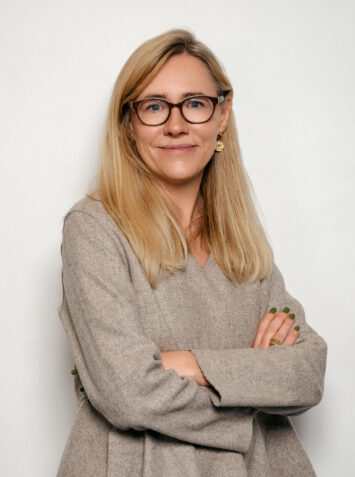K. Ellemann: Strong democracies and trust are the Nordic-Baltic gold
2024/04/09

In light of the complex geopolitical, security, and societal challenges of our time, fostering strong co-operation between the Nordic and Baltic countries is a key factor in ensuring a sustainable and timely response to emerging threats. This important topic was the focus of the discussion “Navigating Together: Nordic-Baltic Cooperation Today and Tomorrow”, which took place in Vilnius and was attended by Karen Ellemann, Secretary General of the Nordic Council of Ministers, Jonas Survila, Vice-Minister of Foreign Affairs of the Republic of Lithuania, and Cecilia Ruthström-Ruin, Director of the Europe and North America Department at the Swedish Ministry of Foreign Affairs.
The Nordic gold – strong democracies
Professor Ramūnas Vilpišauskas, who moderated the discussion on the occasion of the Nordic Day, which is celebrated annually on 23 March Professor Ramūnas Vilpišauskas, highlighted the longstanding friendship between the Baltic and Nordic countries, which dates back even before Lithuania regained its independence.
“We appreciate the Nordic countries’ diplomatic, economic and political support for Lithuania, as our cooperation has only grown stronger since the independence movements began. I remember well how important the support of Denmark, Sweden and Finland was for our country’s independence – they used all possible means to help us on our path to democracy,” Vilpišauskas said at the beginning of the event.
Despite the longstanding partnership and numerous collaborative projects between the Nordic and Baltic countries over the years, participants in the discussion agreed on a pressing issue: the need for a proactive approach to address geopolitical threats collectively. They emphasized the importance of finding solutions today that will equip them to effectively tackle future challenges together.

“We all know the geopolitical situation today, but I would like to be optimistic, because it is very much needed today. Just look at the history of the Nordic and Baltic countries: we have strong democracies and open liberal economies, and this is our most precious resource – our gold. But we should not take it for granted, and cooperation between the countries of the region must be pursued at all levels, and we must make the most of the opportunities it offers – to continue to build successful people-to-people links and exchanges of experience”, noted K. Ellemann
“Resilience is the focus of all Nordic Council of Ministers meetings and discussions, without exception. Resilience is understood in the broadest sense, including green transition, sustainable development, strong democracies and free, unaffected elections”, said Ellemann during the discussion, adding that when talking about the future, “we must ask not what we can do, but what we must do and what we must demand from our governments to be done”.
Sweden turns over a new page
Looking at the current geopolitical situation and its developments, the accession of the new NATO members Finland and Sweden is of particular importance in the context of Nordic cooperation. There is a certain symbolism in this: when Sweden joins NATO in 2024, Lithuania is celebrating the twentieth anniversary of its membership, and it is twenty years since the beginning of the Orange Revolution, when Ukraine had the same ambition, but only two years ago did it get the prospect of joining.
Cecilia Ruthström-Ruin, former Swedish Ambassador to Lithuania and currently Director of the Europe and North America Department of the Swedish Ministry of Foreign Affairs, stressed that Sweden’s accession to this defence alliance undoubtedly opens up a new chapter in the cooperation between the Nordic countries and the Baltics, and fundamentally changes the defence situation.

“In all the years when we were not a member of NATO, certain problems could not be solved with precision, for example, in the defence scenarios in Lithuania, it was difficult to predict what would happen on Swedish territory. Today, this membership brings strength, predictability and stability to the region, and the barriers that existed when discussing certain issues in the context of the debate disappear”, she said.
Asked what she would say is the greatest achievement of the last year in terms of Nordic-Baltic cooperation, Ruthström-Ruin said that her answer is one word: “Trust”: “Of course, it is important in all areas, but if we look at the political level, I would emphasise the trust between leaders, which creates opportunities for discussions that are not always easy to organise in large formats. Informal communication, such as we have in the Nordic-Baltic Eight (NB8) format, is often a key strength and allows for a very flexible response to emerging issues. In retrospect, I would say that the greatest achievement is that the three Baltic States have become members of the EU and NATO. We can only imagine what the situation would be like today if this had not happened.”
Values-based foreign policy
Lithuanian Vice-Minister of Foreign Affairs, J. Survila, underscored the significance of a values-driven foreign policy, aligning Lithuania’s stance with that of the Nordic countries. He cited instances such as providing refuge to Russian opposition figures and the leader of democratic Belarus as manifestations of this commitment. “I believe that it is in fact Alexander Lukashenko who is the opposition to his own people, as well as to law and legitimacy. Democracy, human rights, the rule of law are defended and upheld in our societies, and the Nordic countries have inspired us since our independence and have helped us to set some benchmarks on this path.”

Mr. Survila also recalled a particularly symbolic fact from the 1990s: at the dawn of the restoration of the independence of the Baltic States, the Swedish capital Stockholm used to host Monday rallies in support of their struggle for freedom, while nowadays in Lithuania, the writer and social activist Arkadijus Vinokuras gathers the people every Monday to support Ukraine, which is fighting against the Russian aggression. This symbolic action, according to the Vice-Minister, is inspired by the example of the Nordic countries.
According to Mr. Survila, the most important priority at the moment is to help Ukraine win the war against the aggressor, and to do this it is necessary to mobilize all resources and persuade others to do the same.
“According to the Kiel Institute, the Baltic and Nordic countries are among the leading donors (as a percentage of GDP) but being in the top five in the world is not enough – we need to convince our foreign partners to not only continue, but to step up their efforts. It is essential to have a positive vision for the future that mobilises us not only to achieve victory for Ukraine, but also to be more resilient, greener, and more competitive. Of course, such a vision should not be just words, but concrete actions, initiatives, cooperation formats”, the Vice-Minister said about cooperation with the Nordic countries.
In addition to trust, the other key word that best describes Nordic-Baltic cooperation, according to Mr. Survila, could be integration. “In our case, it meant Nordic support, knowledge and experience for Lithuania and the other Baltic countries in their quest for NATO and EU membership. Today, we could continue this mission by helping Ukraine to integrate into the EU and NATO, as well as Moldova to join the European family as soon as possible, and the South Caucasus countries that wish to do so,” the Vice-Minister said.
Is enough being done facing a threat?
As the geopolitical and security situation in the region changes, the question is often asked whether countries are prepared to deal with threats.
According to K. Ellemann, the strengthening of civil society must now be given particular attention. “It is clear that we are in a new situation, change is not easy, and we need to rethink certain points in our political programmes, especially when it comes to topics related to societal resilience. In a threatening situation, with Europe at war, we cannot forget the role of civil society, which is why I mentioned at the beginning of the event our “gold” – trust and strong democracy. Frankly, I am impressed by how much you have achieved and the difference it makes in the long term,” said the Secretary General of the Nordic Council of Ministers.
Ms. Ruthström-Ruin affirmed this perspective, emphasizing that it is particularly useful to learn from Finland’s highly successful national reserve system in civil defense, and at the same time it is useful to draw from past experiences: ‘To celebrate Sweden’s accession to NATO, our King quoted a booklet called “In case of war” published in the 1960s, the basic information of which was available in every home at the end of the telephone book,. We have kept this tradition and are currently working on a new version of the brochure, which will be called “In case of war or crisis”. The role of society is very important in turbulent times, because we can do a lot and win a lot by working together, by strengthening cooperation, by exchanging experiences, by strengthening local government and by looking at different solutions at the national level.”
